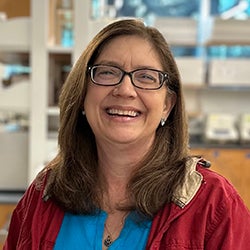Biosciences’ Beason-Abmayr awarded endowed chair
Kathleen and Randall Matthews Chair is Natural Sciences’ first permanently endowed position for non-tenure track teaching faculty

Beth Beason-Abmayr has been awarded the Kathleen and Randall Matthews Chair in Biosciences, the Wiess School of Natural Sciences’ first permanently endowed position for non-tenure track teaching faculty.
Beason-Abmayr, an award-winning teacher and classroom innovator, has taught thousands of students since joining Biosciences in 1998.
“I teach mostly undergraduate labs,” she said. “My first-year lab is a FWIS (First-year Writing-Intensive Seminar) course, and I have three different advanced labs that are in different areas: biochemistry, synthetic biology and molecular biology. And then I teach one lecture course in the spring in animal physiology. Except it’s not a lecture course. I don't really lecture. It’s flipped, and it’s high structure. We do a lot of group work, and it’s a really fun class to teach.”
Beason-Abmayr is also a faculty fellow at Rice’s Center of Teaching Excellence, a faculty associate at Brown College, chair of her department’s undergraduate curriculum committee, a member of both the university academic advising and awards committees as well as the planning committee for the Wiess School of Natural Science’s Russell Shearn Moody Pathway to Research.
She said she was nearly brought to tears when Wiess School Dean Tom Killian told her she was the inaugural recipient of the endowed chair, which was established thanks to a gift from former Wiess School dean Kathy Matthews, the Stewart Memorial Professor Emeritus of Biosciences, and her husband, Randy.
“It was very unexpected,” Beason-Abmayr said. “It’s recognition for education efforts and teaching efforts, which was very validating. I also feel very honored because Kathy is the one that set it up.
“I mean, leave it to Kathy,” Beason-Abmayr said of Matthews, who served as dean of the Wiess School from 1998-2009. “She was always so forward-thinking. When I first developed my physiology class, I went and talked with her for probably an hour and kind of picked her brain. Because she was doing a flipped class that she had developed, BIOS 300, which is still running.”
Beason-Abmayr said she fell in love with teaching while earning her bachelor’s degree in microbiology from Auburn University. Though virtually all teaching assistants were graduate students, a professor recognized her potential and asked her to serve as a TA in a course she’d just taken the previous year.
Beason-Abmayr earned a doctorate in physiology and biophysics from the University of Alabama at Birmingham and completed a two-year postdoctoral research fellowship at Vanderbilt University before joining Rice on a postdoctoral teaching fellowship sponsored by the Howard Hughes Medical Institute.
“I got here, and I was like, ‘Oh my gosh, this is not easy,’ but it’s also where my passion is and where my enthusiasm is and where my reward is.”
At Rice she’s received the George R. Brown Award for Superior Teaching, the Teaching Award for Excellence in Inquiry-Based Learning, the Wiess School’s inaugural Outstanding Teaching Award, and best professor or favorite professor awards from Baker College, Will Rice College and Rice Scholar Athletes. Nationally, she serves on many committees in organizations including the American Physiological Association, the Council on Undergraduate Research, the National Institute on Scientific Teaching and the International Genetically Engineered Machine Competition.
Beason-Abmayr said one of the best things about teaching is that she’s constantly learning.
“If the day ever comes when I think, ‘I don't need to learn anything else,’ I'm done,” she said. “You keep learning. Keep learning. Keep learning. And I try to instill that in my students too.”
